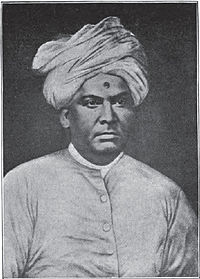C. V. Runganada Sastri
| Calamur Viravalli Runganada Sastri | |
|---|---|

Portrait of C. V. Runganada Sastri
|
|
| Born | 1819 North Arcot, Madras Presidency |
| Died | July 5, 1881 Madras |
| Occupation | civil servant, judge |
| Known for | polyglot, scholar |
Calamur Viravalli Runganada Sastri (c. 1819 – July 5, 1881) was an Indian interpreter, civil servant and polyglot who was known for his mastery over Indian and foreign languages.
Runganada Sastri was born in a poor Brahmin family from a village near Chittoor in the then North Arcot district in the year 1819. His father was reputed to be one of the greatest Sanskrit scholars of the day, but initially could not afford to have him educated. Runganada Sastri began his education at home. By the time he was eight, he had become proficient in Sanskrit. The turning point in Sastri's life came with the arrest of his father for non-payment of land rent when the former was barely twelve years old. Sastri pleaded before the District Judge Casamajor requesting his father's temporary release from prison in order to participate in an annual religious ceremony offering himself as security on his father's behalf. Moved, Casamajor not only released Sastri's father but himself undertook to educate the boy.
Runganada Sastri was initially tutored in private by Casamajor and a Chittoor missionary H. Groves. Within six months, Sastri was able to read and write English. Under Groves' tutorship, Sastri evinced keen interest in mathematics and soon advanced to the study of astronomy. To further Sastri's studies, Casamajor sent Sastri to Madras in 1836 after persuading his parents with great difficulty. Runganada Sastri studied at Bishop Corrie's Grammar School from 1836 to 1839 and the High School (later, Presidency College, Madras) from 1839 to 1842, graduating with honours in 1842.
On completion of his graduation, Sastri wanted to teach at the College of Engineering which was being planned. But the hostile attitude of the government as well as his father's failing health forced Runganada Sastri to return to Chittoor where he got a position as a clerk in the Subordinate Judge's Court at a salary of Rs. 70. During this time, Sastri displayed his rare aptitude for languages and soon mastered Telugu, Hindustani, Persian and Kannada. When his father died soon after, he used his mastery over Indian languages to secure a job as an interpreter in the Supreme Court at Madras. While serving as interpreter, Sastri also started to master European languages like French and Latin. Sastri was soon appointed Chief Interpreter at a pay of Rs. 2,000 - 2,500 a month. When the University of Madras was established in 1857, Runganada Sastri was made a fellow of the university.
...
Wikipedia
